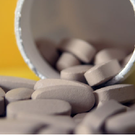Experimental Drug PD 0332991 Shows Encouraging Phase 1 Trial Results In Relapsed/Refractory Multiple Myeloma Patients (ASH 2010)

The results of a Phase 1 trial suggest that the experimental drug PD 0332991 may be a safe and effective treatment for pre-treated multiple myeloma patients.
Dr. Ruben Niesvizky of the Weill Cornell Medical College, who presented the results at the American Society of Hematology (ASH) annual meeting in Orlando last month, pointed out that data about efficacy is limited at this point because it was a Phase 1 trial. However, he added “We are encouraged [by the results] because we have seen two very good partial responses.”
PD 0332991, which is being developed by Pfizer, is an oral drug that works differently than any of the currently approved myeloma treatments; it inhibits cyclin-dependent kinases 4 and 6.
Preclinical studies have shown that PD 0332991 is more efficacious as part of a combination treatment than as a single agent.
Dr. Niesvizky and his colleagues therefore investigated PD 0332991 in combination with Velcade (bortezomib) and dexamethasone (Decadron).
The Phase 1 trial included 21 relapsed and refractory (resistant) multiple myeloma patients who had received a median of four prior therapies.
Nine patients received 75 mg or 100 mg PD 0332991 on days 1 through 21 of a 28 day cycle (Schedule A), and 12 patients received 75 mg or 100 mg PD 0332991 on days 1 through 12 of a 28 day cycle (Schedule B).
The maximum tolerated dose was not determined for schedule A because most patients in each group experienced dose-limiting side effects. For Schedule B, the maximum tolerated dose was determined to be 100 mg PD 0332991 plus 1.0 mg/m2 Velcade and 20 mg dexamethasone.
Two patients, one on each dosing schedule, achieved a very good partial response.
The most common side effects were low blood cell counts, which according to Dr. Niesvizky are known side effects of both PD 0332991 and Velcade.
Dr. Niesvizky added that a Phase 2 trial is underway using the maximum tolerated dose established in Schedule B of the Phase 1 trial.
For more information, please see abstract 860 on the American Society of Hematology annual meeting website.
Related Articles:
- None Found
